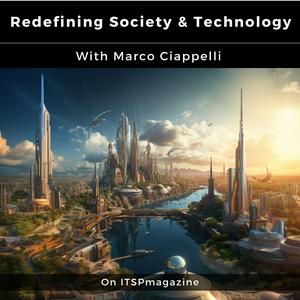Living Forever (Sort Of): AI Clones, Digital Ghosts, and the Problem with Perfection | A Carbon, a Silicon, and a Cell walk into a bar... | A Redefining Society Podcast Series With Recurring Guest Dr. Bruce Y. Lee
Guest: Dr. Bruce Y LeeSenior Contributor @Forbes | Professor | CEO | Writer/Journalist | Entrepreneur | Digital & Computational Health | #AI | bruceylee.substack.com | bruceylee.com Bruce Y. Lee, MD, MBA is a writer, journalist, systems modeler, AI, computational and digital health expert, professor, physician, entrepreneur, and avocado-eater, not always in that order.Executive Director of PHICOR (Public Health Informatics, Computational, and Operations Research) [@PHICORteam]On LinkedIn | https://www.linkedin.com/in/bruce-y-lee-68a6834/Website | https://www.bruceylee.com/_____________________________Host: Marco Ciappelli, Co-Founder at ITSPmagazine [@ITSPmagazine] and Host of Redefining Society PodcastVisit Marco's website 👉 https://www.marcociappelli.com _____________________________This Episode’s SponsorsBlackCloak 👉 https://itspm.ag/itspbcweb_____________________________We’re back at the bar. Bruce is here, the garlic took the day off (too young to drink?), and we’re talking about something that’s not science fiction anymore — the idea that your digital self could outlive you.Yeah. Living forever. Or at least… being replicated forever.It starts with a hologram of Princess Leia and ends with people in Japan marrying bots. And in between? There’s a messy, fascinating, unsettling space filled with AI companions, algorithmic flattery, uncanny valley doppelgängers, and the very real possibility that we’re confusing memory with simulation.Bruce brings up Star Trek — of course he does — where Captain Kirk debates a machine version of a long-dead friend who insists he’s still the real deal. Spoiler: Kirk says no. And I get it. But what if that machine knows everything I’ve ever posted, recorded, written, liked, said, or searched? What if it feels like me?Would you want to talk to it?As always, our conversation doesn’t offer a final answer — we’re not here to draw lines in the philosophical sand. We’re here to hold up a mirror and ask: is that reflection still you if it’s built out of pixels and training data?This episode is personal and playful, but also incredibly relevant. Because we’re already building legacies we don’t fully understand. Every photo, every search, every rant, every laugh — it’s all on the record now. Our historical memory is no longer dusty boxes in the attic; it’s a neural net waiting to be queried.So yeah, one day, you might be sipping your espresso while a synthetic version of your late uncle offers you advice, cracks a joke, and asks if you still listen to that one podcast.Just remember what Captain Kirk said: that might look like him, sound like him, even think like him — but it’s not really him.Still… it’s a hell of a conversation.So join Bruce and me. Pull up a virtual stool. It’s Season 2, Episode 3. And no, that laugh you just heard isn’t AI-generated — not yet.⸻Keywords:digital immortality, AI relationships, uncanny valley, chatbot therapy, synthetic identity, Star Trek, brain uploading, holograms, emotional AI, algorithmic intimacy, digital clone, memory simulation, techno-sociology, posthumanism, virtual consciousness, AI ethics, social engineering, digital legacy, artificial friends, future of identitySee You Next TimeYou'll find links to connect with Bruce and explore his incredible contributions in journalism and medicine. I promise you; he's just as insightful and entertaining as he seems in the series. So, see you next time – same bar, same garlic, new topics!_____________________________Resources/ReferencesThe Singularity Is Nearer: When We Merge with AIby Ray Kurzweil____________________________Listen to more Redefining Society & Technology stories and subscribe to the podcast:👉 https://redefiningsocietyandtechnologypodcast.comWatch the webcast version on-demand on YouTube:👉 https://www.youtube.com/playlist?list=PLnYu0psdcllTUoWMGGQHlGVZA575VtGr9Are you interested Promotional Brand Stories for your Company and Sponsoring an ITSPmagazine Channel?👉 https://www.itspmagazine.com/advertise-on-itspmagazine-podcast

